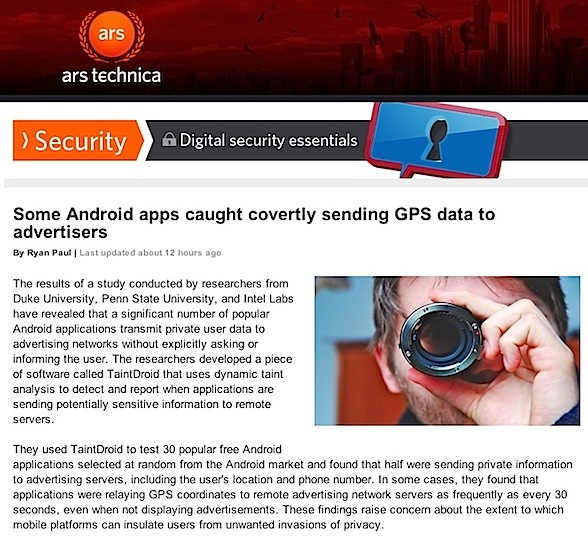Following up on our discussion about how people can be ‘tracked’ through Facebook, Facebook leaks like a sieve, here’s another twist.
Ars Technica reports research which found:
“a significant number of popular Android applications transmit private user data to advertising networks without explicitly asking or informing the user.“
Um, by golly. I don’t like the sound of that.
They used TaintDroid to test 30 popular free Android applications selected at random from the Android market and found that half were sending private information to advertising servers, including the user’s location and phone number. In some cases, they found that applications were relaying GPS coordinates to remote advertising network servers as frequently as every 30 seconds, even when not displaying advertisements. These findings raise concern about the extent to which mobile platforms can insulate users from unwanted invasions of privacy.
I remember reading about a Disney-branded cell-phone you could buy your little darling, with built-in GPS tracking — but that’s for YOU to help keep an eye on where YOUR FAMILY member was.
That’s a far cry from an advertiser tracking your movements by GPS.
What the hell…?



I’ve got my new iPad and have been installing apps like the WordPress blogging tool (complete with passwords), Firefox Home that syncs yet more passwords and games with classy names like “Fly Control”.
I’ve also just installed Titanium Developer on my PC so that I can take a look at just how invasive an app can be. As a user I have no understanding of how sandboxed an application is and what they can and can’t see.
I know, for example, that ContactP can see my contact list from the native iPad app.
But what else can get into my contact list so that it can broadcast not only my details but those of all my “contacts”.
The cliche “no such thing as a free lunch” stands the test of time!
Yeeees. Beware free (as in beer).
I noticed the article discussed Android, not Apple’s iOS … and I know Apple have issued warnings to developers that they won’t approve placement in the App Store for, you know, dirty tricks like this… but you’re right to be wary, in my view.
I’ve never wanted to ‘sync’ my contacts with my iPhone Facebook app because I don’t trust Mark ‘end of privacy’ Zuckerberg.
But yeah, I expected ad-supported to mean they were selling ATTENTION to the interruption, like SEEK ads in the bottom of my free Dictionary.com app … (see it *works*) … but that behaviour has driven me back towards the PAID Ultra-lingua Dictionary with no such distractions.
But selling my personal information? Uh, no way, José… – P
It took me a while, but I found the comment by ‘Justonemorelatte’ 😉 that made such an impact on me a long time ago… (it related to content-scraping) … which I apply to Google’s services:
http://yro.slashdot.org/comments.pl?sid=53128&cid=5253208
My version: “If the service is free, you aren’t the consumer. You are the product. YOU are what’s being sold.”
Ultimately we all have to pay the bills.
If we’re not paying for something upfront then ask yourself how the provider justifies the deal.
I love how on iTunes I can get great games at a fraction of the cost I’d pay if they had to package, distribute, allow for shop lifting, unsold or damaged items. Hopefully the trigger happy (hell, its only a dollar) consumers will mean that developers earn plenty. And lets hope iTunes monitoring is as good as it should be!
Yes, agreed re if you’re not paying … no problem with that … but there’s a ‘style’ and transparency issue, which the original article highlights about those Android apps — they’re supplying my data by stealth & subterfuge (please don’t refer me to a fine-print EULA!)
I’d never agree to my LOCATION and PHONE NUMBER being passed on to an ‘advertiser network’ without my knowledge. That wasn’t the deal. Likewise contacts.
I saw a FAQ/demo of Dragon Dictate for the Mac this week, which noted that — if you authorised it — the program would load your Mac’s address book to the DD server to assist with voice-recognition of your contacts … but that that was (a) an option you needed to overtly select, (b) the data wasn’t accessible to anyone else and (c) was removable. Open. I like that.
re iTunes, yup, the world-class, worldwide, one-click, secure distribution/revenue gathering/accounting system for App developers is something for them to be grateful for (well, it’s win-win) … Ask yourself: how else could a little software shop get its products to a global market in a comparable way? Stunning.
I actually WANT Apple to be a bit ‘fascist’ in their App store approval system — keep my iPhone/iPad working optimally without exploits and hacks and undocumented subroutines … and don’t allow scammers and data drillers… please. – P
[…] small issue, yes, I agree. Never mind. Oh yeah, and maybeI’m NOT the customer…) Share […]